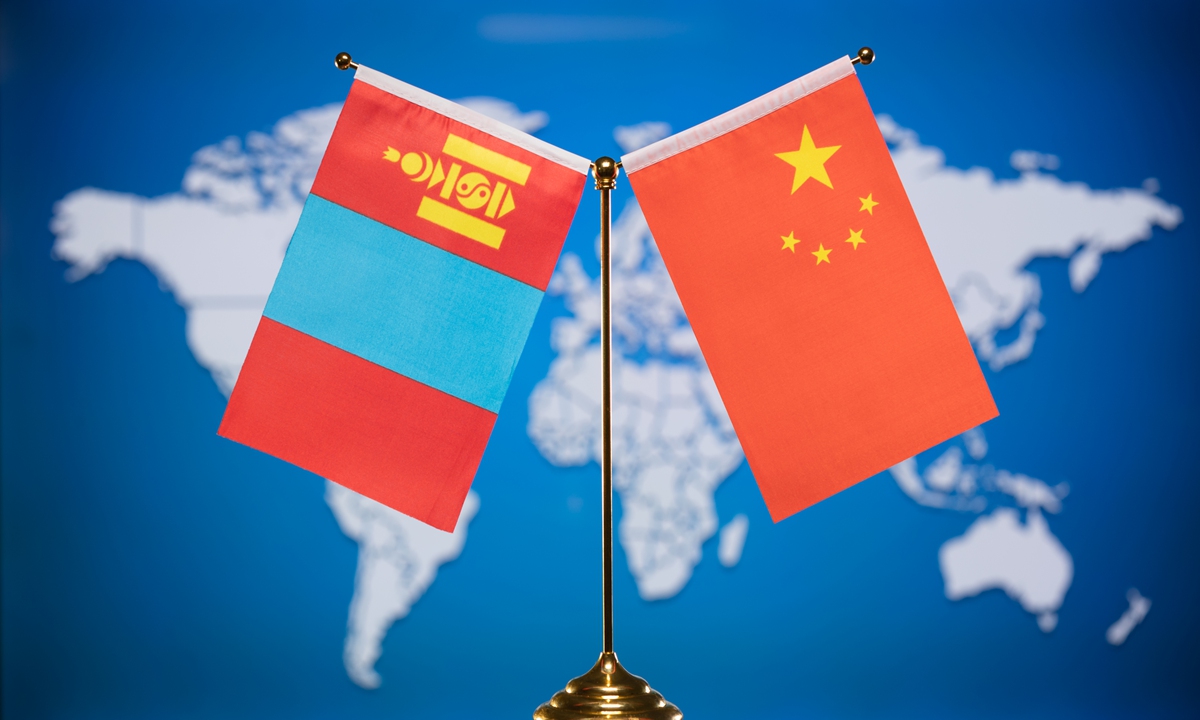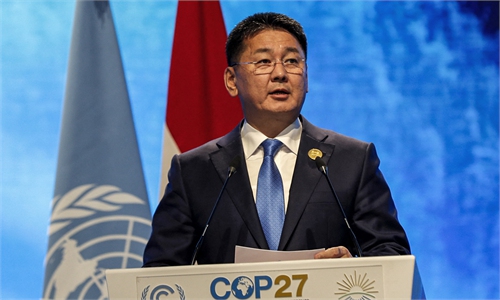Mongolian president's visit expected to yield fruitful results under BRI; West's hype cannot vilify concrete benefits

China Mongolia Photo: VCG
Mongolian President Ukhnaa Khurelsukh is paying a state visit to China from Sunday to Monday, the first visit since he assumed office in June 2021, reflecting a continuation of the friendly tradition of close high-level contacts between the two sides and the high-level development of their comprehensive strategic partnership, experts said.
Leaders, representatives and delegations from neighboring countries are visiting China in succession since the 20th National Congress of the Communist Party of China concluded in October. They know well that Chinese modernization will bring new opportunities to the world, and trade and investment with China is extremely important, experts said.
Zhao Lijian, spokesperson of the Chinese Foreign Ministry, announced last week that during the visit, Chinese President Xi Jinping will hold formal talks with
Khurelsukh and the two presidents will jointly witness the signing of cooperation documents.
Chinese Premier Li Keqiang and Li Zhanshu, chairman of the Standing Committee of the National People's Congress, will meet with President Khurelsukh respectively, according to Zhao.
The leaders of the two countries will have an in-depth exchange of views on bilateral relations and international and regional issues of mutual interest, and jointly chart the future course of the growth of China-Mongolia relations, Zhao said.
"Politically, the two countries share many ideas on global governance, cooperation within the framework of the Shanghai Cooperation Organization (SCO) with Mongolia being the observer state and issues of security and stability in the Eurasian region. Pragmatically, the extension of the China-Mongolia-Russia Economic Corridor will include more fields of cooperation including cross-border trade, digitalization, medical care, education among others," Li Yongquan, director of the Eurasian Social Development Research at the Development Research Center of the State Council, told the Global Times on Sunday.
China, Mongolia and Russia extended the Outline of the Development Plan on Establishing the China-Mongolia-Russia Economic Corridor by five years in Samarkand, Uzbekistan this September, which will unleash great potential for regional prosperity while upgrading Mongolia's role as a transit hub.
Mongolia, like many countries with vulnerable economies, is facing high debts risk due to a failing global economy and the impact of the pandemic. It needs China's assistance in this regard, Wang Yiwei, director of the Institute of International Affairs at Renmin University of China, told the Global Times on Sunday.
Mongolian Ambassador to China Tuvshin Badral said in a recent interview with China Central Television that the economic advantages of China and Mongolia are highly complementary, and the economic and trade cooperation has been mutually beneficial and stable in the long term.
Last year, the two sides saw trade volume exceed $10 billion for the first time. China and Mongolia will expand cooperation in trade, investment, minerals, energy, communications, digital economy and green development within the framework of the Belt and Road Initiative, the ambassador said.
China has been Mongolia's top investment source and trade partner for 18 consecutive years. Total trade between China and Mongolia accounts for more than 60 percent of Mongolia's foreign trade volume, China News reported.
Particularly worth mentioning is that cooperation on the construction of transportation routes and corridors has been greatly boosted in recent years, which has sped up logistics between China and Mongolia and greatly increased transport capacity for bulk commodities, especially mineral products.
Currently, Mongolia is looking to dock multiple new railway lines with Chinese ports and hoping to provide strong traction for China-Mongolia economic and trade growth.
The West has been hyping that Mongolia is "ramping up efforts to export coal to energy-hungry China, despite global efforts to end the use of the polluting fossil fuel," according to VOA News, citing Mongolia's shipping of 19 million metric tons of coal to China so far this year.
However, observers pointed out that China has been making great advances in the desulfurization technology for coal, thus reducing emissions of sulfur dioxide to a great extent. China can help Mongolia transform its coal throughout the process from mining to transportation, so the two sides have huge potential in energy transformation cooperation. It is also in line with China's promotion of a green Belt and Road, Wang said.
Experts said there are many complementarities between the two countries in fields including minerals, road and corridor infrastructure construction, cross-border trade and commerce, among others. Cooperation highlights in the horse industry and cross-border grassland tourism are also expected.


